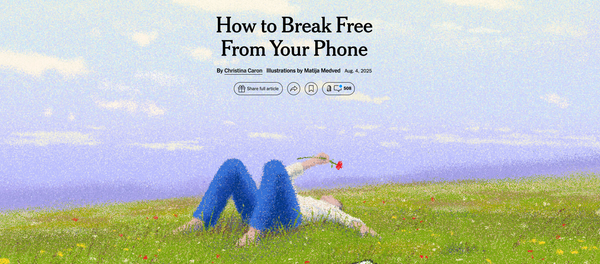Forming Finitude
Spiritual practices for mere mortals, part 1

Note: It's possible this post inaugurates a significant pivot for the attention of this newsletter. I recognize forming finitude is not as delightful a concept as forming playfulness, and I don't yet have non-trivial thoughts on how the two might be related. But I've been struggling to get some conceptual purchase since returning to more steady writing in the weeks following our great caregiving ordeal. For now, at least, I'm feeling very pulled in this direction. I hope you'll travel with me for a while and see where we go together.
On March 9, 2011, the Virginia Theological Seminary community welcomed priest and theologian Martin Smith as the facilitator of our Ash Wednesday quiet day. (The VTS chapel burned down in the fall of my second year, so it's easy to place liturgical memories due to the fact that my MDiv class worshiped in three separate spaces for each of our three years of study.)
In the course of his meditation, Smith said something appropriate to the occasion that has stuck with me for the 14+ years since.
He started with a windup I don't remember verbatim but went something like this:
Today is a day that presents us with an urgent reminder. As church leaders, we need to be deeply in touch with our own creatureliness. You are a finite, mortal being with needs and limitations. And if you can't remember that ...
And he finished with a phrase I definitely recall exactly and can still hear clearly in his rich British baritone, slow and soft and emphatic:
... you will be a menace.
Much of the discernment process and seminary experience (at least on the ordination track) involves being told that you will be a servant, a blessing, a gift to the church, an equipper of the saints, an example of godly living, etc., etc. So when one of the most distinguished Anglican spiritual voices of a generation tells you something very much to the contrary, you sit up and pay attention.
At the time, I thought he was talking primarily about sin. It was, after all, the kickoff to the great Christian season of self-examination, which I don't mind saying can be a little insufferable on a seminary campus. (Obviously, The Dutiful Mr. Oliver contributed to this climate of earnest but misguided spiritual questing.)
The sin-centric interpretation made sense to me. I thought, "Amen! If we're not regularly making confession, identifying ways we're turning our back on God, and lamenting our selfishness and idolatry, how will we be empathetic companions to others on the same journey?" A fair sentiment, as far as it goes.
Like a lot of ambitious people, I didn't get a clear sense for how profoundly I was denying my own finitude until Kristin and I had a child. Suddenly, mental fatigue and willpower were not the primary hard limits on my ability to work, think, produce.
Even getting up at 5 a.m., the oldest and most reliable trick in my book, barely made a difference in my desperate attempt to find enough hours in the day—and be meaningfully present in those hours—to accomplish the research, teaching, writing and editing, media management, and other labors I had been overfilling my days with since undergrad.
It's been a couple years now since I gave up waking at 5 a.m. And with F preparing to start kindergarten, some of the limitations that kicked off my personal fascination with finitude have eased.
Still, what's kept this theme front and center in my attention—besides, obviously, the experience of caring for a dying loved one—is how profoundly misguided I think it is for consumers of AI products (or, for that matter, any productivity system) to think they can successfully cheat finitude.
The AI newsletter I roll my eyes at every morning is called Superhuman. I kid you not, I just opened today's edition 100% confident that I'd be able to post verbatim an example of what I mean. Survey says ...
Need better content, faster–with just a prompt? Traditional content is yawn boring [?!]. That’s why 50M+ use ______ to turn simple prompts into standout content instantly–with zero design skills or experience.
In the coming weeks, I'll have more to say about the cognitive and spiritual limitations of AI—a technological achievement I nevertheless admire and use somewhat regularly in ways I hope are thoughtful and responsible. (I sure don't use it for this newsletter except in halting attempts to get it to help me stay organized about future topic ideas.)
For now, I'll just say that I'd like to spend some time in this space thinking about spiritual practices for embracing our finitude. Because the problem of being told many times per day that an LLM-powered "solution" can help you achieve "superhuman" results in any endeavor is going to get worse before it has any chance of getting better. Stay tuned.
PS I've got a few thematically appropriate recs today:
Is it ok to just work all the time? – An honest and fascinating conversation between PJ Vogt and Ira Glass that was pretty clarifying for me.
Everyone Is Cheating Their Way Through College – Wowzer, this is bleak, primarily for what it forebodes about diminished capacities for true critical thinking in the age of "just asking questions" conspiracy theorizing.
‘We Have to Really Rethink the Purpose of Education’ – Pretty focused on K-12, but still broadly relevant to anyone who cares about teaching and learning. Thoughtful and a bit more hopeful conversation than a lot of what's out there. (And The Disengaged Teen is sure on my reading list now.)



